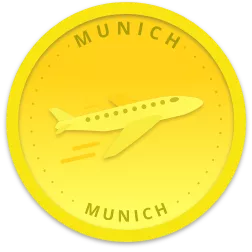"Toytown"
The world's largest beer festival started as a wedding reception that got way out of hand. In 1810, Crown Prince Ludwig married Princess Therese, and the royal family threw such an epic party with horse races that the locals demanded a repeat performance the next year. And the next.
Today, Oktoberfest draws 7.2 million visitors who consume 7 million liters of beer on the same field, still called Theresienwiese after the bride.
Munich began in 1158 with a medieval shakedown. Duke Henry the Lion built a bridge over the Isar River next to a Benedictine monastery, then destroyed the competing bridge owned by the Bishop of Freising. Traders had one option: pay Henry's tolls or swim.
Emperor Frederick Barbarossa let Henry keep the setup, and München, meaning "by the monks," grew into Bavaria's capital.
The Wittelsbach family ruled Bavaria from Munich for over 700 years. King Ludwig II, crowned in 1864, became famous for building absurdly expensive fairytale castles and being a tech geek centuries before Silicon Valley.
His sleigh, lit by battery-powered bulbs in 1879, was the first electrically illuminated vehicle in Bavaria. The guy worked at night, slept all day, and spent money like it was going out of style. He drowned mysteriously in 1886, leaving Bavaria broke but with killer castles.
In 1516, Duke Wilhelm IV signed the Reinheitsgebot, declaring beer could only contain water, barley, and hops. Period.
This beer purity law remains the oldest food regulation still enforced. Only six Munich breweries can serve beer at Oktoberfest: Augustiner, Hacker-Pschorr, Hofbräu, Löwenbräu, Paulaner, and Spaten.
Munich hosted the 1972 Summer Olympics, hoping to showcase a modern, peaceful Germany. On September 5, Palestinian terrorists attacked the Olympic Village, killing 11 Israeli athletes and coaches. The rescue attempt failed catastrophically.
The tragedy reshaped global security at sporting events.
Visit Marienplatz at 11 a.m. to catch the Glockenspiel's performance. Walk to the English Garden, one of the world's largest city parks, and watch year-round surfers on the Eisbach wave.
Tour Nymphenburg Palace's Baroque interiors and gardens. Eat weisswurst with a giant pretzel and sweet mustard at Hofbräuhaus before noon, because eating this breakfast sausage after lunch is apparently a crime against Bavaria. Peel off the casing, unless you want locals spotting you as a tourist from across the beer hall.


XP EARNED OUT OF 0
Points Breakdown
| Sticker Collected | 0 XP |
| Card Collected | 0 XP |
| Bonuses | 0 XP |
| Total | 0 XP |
Local Airport
Munich Airport

Elevation
453 m
Opened
1992
Runways
2


